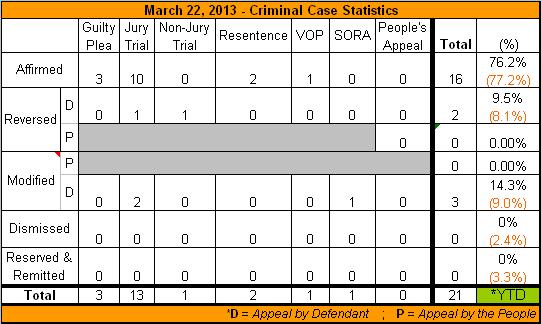Criminal Case Summaries:
·
People
v Evans (KA 10-01056) – 4AD reverses D’s conviction of second degree
assault because it is against the weight of the evidence. D was convicted of
that crime when a sawed-off shotgun he was holding misfired and injured another
person. D and others were drinking alcohol at a park in Syracuse
·
People
v Johnson (KA 12-00361) – In this SORA case, 4AD modifies D’s risk
level from three to two, because the prosecutor did not prove, by clear and
convincing evidence, that points were warranted under risk factor
7—relationship with the victim. Specifically, the prosecutor did not establish
that D “established or promoted” his relationship with the victim, who he met
at a party, for the primary purpose of victimizing her.
·
People
v Montgomery (KA 09-00153) – 4AD reverses D’s drug possession
conviction because the indictment was rendered duplicitous by the proof
presented at trial. Police executed a search warrant on a house after observing
D conduct an apparent drug transaction. The search yielded several baggies of
cocaine from the entryway of an unoccupied apartment, and a second uncut
quantity of cocaine from an occupied apartment. D was indicted on one count of
possession, but neither the indictment nor bill of particulars specified which
cocaine D was charged with possessing. The People, however, stated before trial
that the grand jury found the evidence regarding the uncut quantity
insufficient. At trial, the prosecutor presented evidence of D’s constructive
possession of both amounts of cocaine. This rendered the indictment
duplicitous, and it could not be known whether the jury reached a unanimous
verdict with respect to D’s possession of the baggies of cocaine, as opposed to
the uncut cocaine.
·
People
v Woods (KA 08-02465) – 4AD finds that the lower court failed to
consider the appropriate factors before permitting the jury to hear D’s grand
jury testimony, which included references to D having sold drugs, having been
in prison for bank robbery, and being on parole. Such references in otherwise
admissible grand jury testimony should be redacted unless they are necessary to
a full comprehension of the directly relevant portions. Here, the lower court
considered only whether D’s testimony was voluntary. But, 4AD finds that the
error was harmless.
Family Court Case Summaries:
·
Matter
of Mercado v Frye (CAF 11-01763) – In this custody proceeding, 4AD
finds that the lower court had continuing jurisdiction over the matter pursuant
to Domestic Relations Law § 76-a. Even though the child had been living with
the mother in California , the initial custody
determination was made in New York California
·
Matter
of Nelson v Morales (CAF 11-02203) – In this custody proceeding, the
mother appealed from a modification order granting custody to the father. The
father had filed a prior modification petition in 2007, which was denied after
a hearing. The mother argued that the Family Court erred by considering her
pre-2007 changes in residence in determining whether a change of circumstances
had occurred since the last modification proceeding. 4AD disagrees, and finds
that this evidence was properly considered as background information, to
determine the significance of the mother’s post-2007 change in residence.

No comments:
Post a Comment